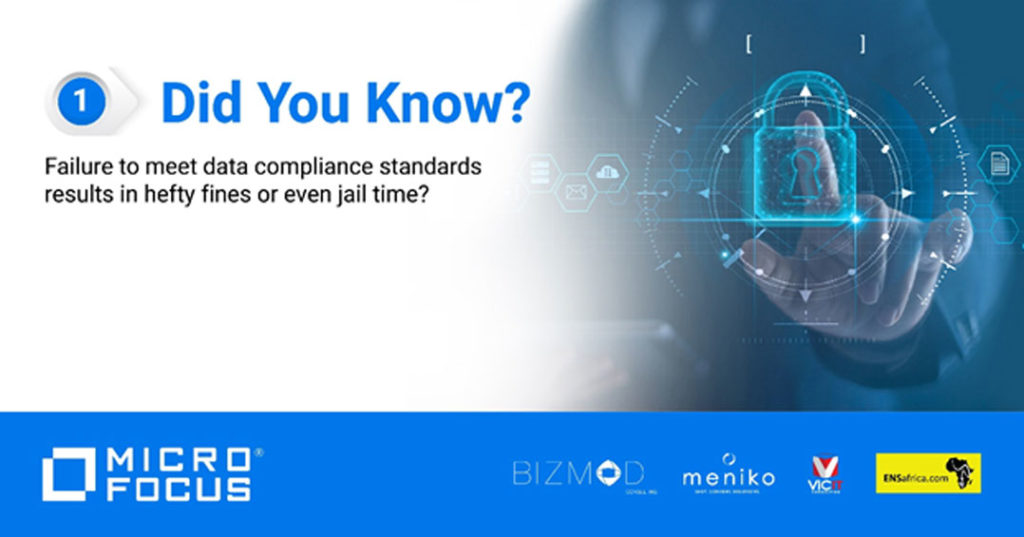 Between 40% and 60% of the unstructured data that Micro Focus indexes and explores for its customers turns out to be redundant, obsolete or trivial.
Between 40% and 60% of the unstructured data that Micro Focus indexes and explores for its customers turns out to be redundant, obsolete or trivial.
Consider what that means for your business. “If a customer called you up tomorrow and asked to be deleted — which is legally known as the right to be forgotten — from your database, how quickly, if at all, would your organisation be able to action this request?” asks Gareth de Laporte, channel manager at Micro Focus.
“It’s an issue that we see frequently. Large organisations don’t know how many different pieces of data they have relating to an individual. They don’t know where it’s all stored, how accurate it is or how many different departments have siloed information.”
What you don’t trust, you can’t use
Known as bad data, it’s a problem that is costing businesses anywhere between US$9.7-million and $14.2-million annually. According to Gartner, at a macro level, bad data is estimated to cost the US more than $3-trillion/year. This covers the storage of obsolete, redundant and duplicate data, as well as the productivity and efficiency costs of working with poor data.
“When you don’t trust your data, you’re always double-checking it,” says de Laporte. “Something that is meant to give you much greater insights into your customers, their needs, where your cross-sell and up-sell opportunities are, and what products and services you should be investing in just becomes a costly drain on resources.”
Regulators are cracking down
This doesn’t take compliance issues into account either. On an international level, regulations such as GDPR are focusing on protecting personal information and holding organisations and individuals accountable if businesses don’t take these regulations seriously. At a local level, the Promotion of Access to Information Act and the Protection of Personal Information Act do the same.
“We’re expecting the Protection of Personal Information Act to come into full effect this year,” says de Laporte. “Business leaders who don’t take it seriously and who don’t have a solid handle on their data could find themselves facing hefty fines – or even jail time.”
 Taking control of your data
Taking control of your data
The business case is clear – if the threat of fines isn’t enough, the lost opportunities and high impact on productivity across your organisation are a solid case for taking control of one of your greatest asset, your data.
Here are four key steps that you can take to point your organisation in the right direction:
- Admit that you probably have a data quality problem. Unless you are already addressing data quality aggressively and proactively, it’s likely that your businesses is overloaded with bad data. Before you can actively address this, you need to admit that there is a problem, and that a solution is required. Simply shifting everything to the cloud isn’t enough. You need the ability to discover, manage, secure and dispose of data in a complaint, cost-effective, secure and reliable way.
- Focus on your systems of control. Begin with the data that you expose to customers, regulators and anyone else outside of your enterprise. Are your systems of controls adequate? Everyone in your organisation, from the CEO down to reception are responsible for data privacy. Make sure you’re supporting them with the right information and controls.
- Define and implement an advanced data quality programme. You already have too much data, and this is growing daily. Only a quality programme can help you with the approach mentioned in point one – the ability to discover, manage, secure and dispose of data in a complaint, cost-effective, secure and reliable way.
- Critically evaluate the way you treat data. Every business says it values data. We do a lot to collect and store data. And then we don’t manage it properly. Only a real data management system that can discover, move and index data can give you the tools and control you need to be both compliant and give you the ability to use your data properly.
To find out more about Micro Focus’s Privacy solution and what it can do for your organisation, visit Micro Focus.
About Micro Focus
Micro Focus helps you run and transform your business. Driven by customer-centric innovation, its software provides the critical tools you need to build, operate, secure and analyse the enterprise. By design, these tools bridge the gap between existing and emerging technologies – which means you can innovate faster, with less risk, in the race to digital transformation.
- This promoted content was paid for by the party concerned




